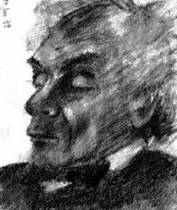
Jonathan Sternberg
Born: July 27, 1919 - New York, USA
The American conductor, Jonathan Sternberg, is regarded by many as one of the most distinguished conductors appearing on the international podium, his performances having been unanimously acclaimed by critics, musicians and public alike from Berlin to Buenos Aires.
Jonathan Sternberg was born in New York of Austro-Russian parents. As a child he studied violin at the Institute of Musical Art (now the Juilliard School) in New York from 1929 to 1931. He continued his musical and academic education at the Manhattan School of Music, New York University, receiving B.A. in 1939 with viola and musicology as principal subjects. He followed that by studies in musicology at NYU Graduate School and Harvard from 1939 to 1940. During his undergraduate years, he was active as a New York critic for the Musical Leader of Chicago; he also attended rehearsals of the National Orchestral Association conducted by Leon Barzin, from whom he acquired his conducting technique. Apart from two later private sessions with Barzin (1946) and two summers (1946-1947) of conducting lessons with Pierre Monteux, he was self-taught.
Jonathan Sternberg began his professional career on Pearl Harbor Day, December 7, 1941, conducting the National Youth Administration Orchestra of New York in Copland's An Outdoor Overture, before entering military service. At the end of the war he found himself in Shanghai where he took over the Shanghai Symphony Orchestra for a season.
After returning briefly to the USA, Jonathan Sternberg moved to Vienna, making his conducting debut with the Vienna Symphony Orchesta in 1947. Then he toured extensively as a guest conductor in Europe, North America, and the Far East. He worked closely with the Haydn scholar H.C. Robbins Landon, scouring the libraries, monasteries and churches of Austria for lost manuscripts, until Robbins Landon set up the Haydn Society, for which Sternberg made a series of pioneering recordings, initially of Haydn and Mozart, not least the ‘Nelson Mass’, ‘Posthorn’ Serenade and some dozen Haydn symphonies. Other recording premières under Sternberg included Schubert's Second Symphony, Rossini's Stabat mater, Prokofiev's Fifth Piano Concerto, Milhaud's Fantaisie Pastorale and Charles Ives's Set of Pieces.
Jonathan Sternberg also began to present modern American music to European audiences that had heard little of such repertory. With the RIAS orchestra in Berlin he conducted the first European performances of a large number of American scores, including Bernstein's Serenade, Menotti's Violin Concerto and the Second Symphony of Charles Ives. With other orchestras, Sternberg conducted the first European performances of works by Barber, Copland, Diamond and Benjamin Lees. He was also responsible for a number of world premières, including Rorem's First Symphony (1951) and Lászlo Lajtha's Sixth (1961).
After a year at the helm of the Halifax Symphony Orchestra (1957–1958), Jonathan Sternbereg was Music Director and the Principal Conductor of the Royal Flemish Opera in Antwerp, Belgium for five years (1961-1966). In 1966 he returned to the USA to accept an appointment as the Musical Director and Principal Conductor of the Harkeness Ballet York (1966-1968). Concurrently he was Musical Consultant to the Rebekah Harkness Foundation for their Ballet Commissioning program. Some years later he was appointed musical director and conductor of the Atlanta Municipal Theater in charge of opera and ballet performances at the new Memorial Cultural Center (1968-1969), opening the new Atlanta Memorial Arts Center with the American stage première of Purcell's King Arthur. He has also been associated with Col. De Basil's Ballet Russe de Monte Carlo. Outstanding among his guest engagements have been the first European tour of the Mozarteum Orchestra of Salzburg, several all-Beethoven concerts with the London Philharmonic Orchestra in the Royal Festival Hall, appearances with the Orchestre de la Suisse Romande in Geneva, the Orchestre Lamoureux in Paris, the orchestras of Warsaw, Prague, Berlin, Munich, Stuttgart, Basel, Brussels, Monte Carlo, etc.
After Atlanta Jonathan Sternberg has divided his professional time with the academic world. He took up a visiting professorship of conducting at the Eastman School of Music in Rochester, New York (1969-1971). On leaving he took up a similar position at Temple University, Philadelphia, PA, where he taught and conducted for 20 years (1971-1989). Here, too, he conducted a number of world premières, including Music for Chamber Orchestra by David Diamond (1976), A Lincoln Address and Night Dances by Vincent Persichetti (1977) and Stanislaw Skrowaczewski's Ricercari notturni for three saxophones and orchestra (1978). From 1989 he has been a lecturer at Chestnut Hill College. In addition he has continued pursuing his career as guest conductor on five continents. In his 80s he was still active on the podium and as a lecturer. From 2004 to 2008 he he was Musical and Artistic Director of the Bach Festival of Philadelphia, sister Festival in the USA to the Leipzig Bach Festival.
A long list of recordings made in Vienna, Salzburg, Paris and Zürich has made the name Jonathan Sternberg a familiar name to discophiles internationally. Among the artists with whom he has collaborated in concert and opera, are Isaac Stern, Yehudi Menuhin, Heryk Szeryng, Paul Badura-Skoda, Alfred Brendel, Annie Fischer, Philippe Entremont, Byron Janis, Teresa Stich-Randall, Lisa Della Casa, Hilde Gueden, George London and Paul Schoeffler.
In January 2009 Jonathan Sternberg received The Conductors Guild's Award for Lifetime Service in recognition of long-standing service to the art and profession of conducting.
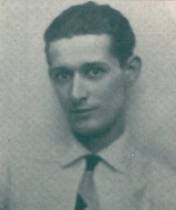
Hugues Cuénod
Born: June 16, 1902 - Corseaux-sur-Vevey, Switzerland
The notable Swiss tenor, Hugues (-Adhémar) Cuénod, received his training at the Ribaupierre Institute in Lausanne, at the conservatories in Geneva and Basel, and in Vienna.
Hugues Cuénod commenced his career as a concert singer. In 1928 he made his stage debut in Jonny Spielt auf in Paris, and in 1929 he sang for the first time in the USA in Bitter Sweet. From 1930 to 1933 he was active in Geneva, and then in Paris from 1934 to 1937. During the 1937-1939 seasons, he made an extensive concert tour of North America. From 1940 to 1946 he taught at the Geneva Conservatory. In 1943 he resumed his operatic career singing in Die Fledermaus in Geneva. He subsequently sang at Milan’s La Scala (1951), the Glyndebourne Festival (from 1954), and London’s Covent Garden (1954, 1956, 1958).
Hugues Cuénod is a singer who has sung everything, from Machaut to Igor Stravinsky. Among his finest roles were Mozart’s Basilio, the Astrologer in The Golden Cockerel, and Sellem in the Rake’s Progress. An outstanding sight-reader, with a flair for the unusual, he has left a discographic heritage of the first order. Especially noted for his recordings of mélodie, Bach and Elizabethan song, his performing career continues, which is noteworthy for someone born in 1902. He holds the record as the oldest person to make a debut at the Metropolitan Opera, singing the Emperor there in Turandot in 1987.
In an interview in 1997, 95-year-old Swiss tenor Hugues Cuénod talked to pianist Graham Johnson, recalling pre-war Vienna and Paris, where he frequented aristocratic salons and worked with Nadia Boulanger. After the war, the new early-music boom relied heavily on his light, unmannered, natural sound, and Cuénod made several pioneering LP’s - his 1950 recording of François Couperin's Lamentations prompted I. Stravinsky to ask him to sing in the premiere of The Rake's Progress. Opera has been a constant thread, but at the heart of Cuénod's repertoire is French song - he knew and worked with Arthur Honegger, Auric, Roussel, Francis Poulenc and others.
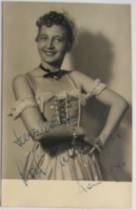
Rösl Schwaiger
Born: September 5, 1918 - Saalfelden by Salzburg, Austria
Died: April 19, 1970 - Munich, Germany
The Austrian soprano, Rösl Schwaiger, was trained at the Salzburger Mozarteum.
Rösl Schwaiger made her debut in 1940 at the Salzburg’s Landestheater as Queen of the Night in Zauberflöte. From 1942 to 1945 she sang at the Wiener Volksoper. From 1945 to 1952 she was a member of the Wiener Staatsoper. From 1952 to 1963 she worked as the first coloratura soprano at the Bayerischen Staatsoper of Munich, since 1952 she also appeared regularly at the Theater am Gärtnerplatz there. She sang at the Salzburg Festival in 1945 Blondchen in Mozart’s Entführung aus dem Serail, in 1946 Sophie in Rosenkavalier and Barbarina in Le Nozze di Figaro.
Since 1945 Rösl Schwaiger participated for several years in the big concert performances of the Salzburg Festival, particularly in the sacred music works of Mozart, and became one of the most popular singers of the Salzburg Festival. In 1947 she appeared at the Covent Garden Opera in London as Barbarina in Le Nozze di Figaro. In 1946 she appeared as a guest at the Stadttheater of Basel, in 1963 at the Festival of Bregenz. The artist, who excelled particularly as Mozart interpreter, undertook in 1954 a very successful North America tour. In 1957 she sang at the Festival of Glyndebourne Blondchen, Papagena in Zauberflöte and Najade in Ariadne on Naxos. In 1968 she gave a series of Lieder recitals in Greece and in Turkey.
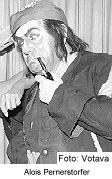
Alois Pernerstorfer
Born: June 3, 1912 - Vienna, Austria
Died: May 12, 1978
The Austrian bass, Alois Pernerstorfer, began his training in 1933 at the Vienna College of Music with Theo Lierhammer and with Josef Krips.
Alois Pernerstorfer made his debut in 1936 at the State Theatre of Graz as Biterolf in Tannhäuser. After three-year activity in Graz he came in 1939 to the Vienna Volksoper. In 1945 he joined the Vienna State Opera, whose member he remained from then. In 1947-1948 was temporarily engaged at the City theatre (Opera House) of Zurich, and afterwards appeared there often as a guest. In Zurich he participated in 1947 in the premiere of the opera Der unsterbliche Kranke by Hans Haug. The artist sang at the Festivals of Edinburgh and Glyndebourne (1951 as Figaro in Le Nozze di Figaro and as Leporello in Don Giovanni) and almost annually at the Salzburg Festival. There he sang in 1948, 1953 as well as 1956-1958 the Antonio in Le Nozze di Figaro, 1957 Orest in Elektra by R. Strauss, 1958 in Vanessa by S. Barber, 1959 in Schweigsamen Frau by R. Strauss, 1962-1963 Arkas in Iphigenie in Aulis by Gluck, 1959-1960 in Zauberflöte, 1960 and 1963 in Rosenkavalier, 1964 in Verdi’s Macbeth and in August 1953 in the premiere of the opera Der Prozess by G. von Einem. In addition he appeared in many concerts in the Festival (for the first time already 1937). He appeared in Salzburg in the premiere of Mozart’s La finta semplice. Under the direction of Bernhard Paumgartner followed then appearances with this youth opera of Mozart in the European music centres (Paris, London, Brussels, Germany, Scandinavia). Appearances brought him also to the Milan’s La Scala (1950, Alberich in Nibelungen Ring under Wilhelm Furtwängler), to the Teatro Liceo of Barcelona, to the Grand Opéra Paris and to the Opera (Théâtre de la Monnaie) of Brussels. In the period of 1951-1952 he was member of the Metropolitan Opera New York.
Alois Pernerstorfer also appeared successfully as a concert singer. He was married with the soprano Henny Herze (1906-1993), who had a successful career at the Vienna Volksoper, particularly as operetta singer.
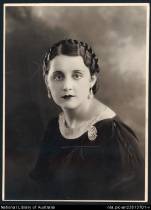
Lorna Sydney
Born: 1912 (?) - Perth, Australia
The grandfather of the Australian mezzo-soprano Lorna Sydney had been pianist and a singer, her father was well-known as cellist and a composer. She studied first piano playing and gave at the age of with 16 a concert with the Symphony Orchestra of Perth, with which she played the Piano Concerto Grieg. Later she sang with wandering Italian opera group in Perth the parts of Santuzza in Cavalleria Rusticana and Nedda in Bajazzo. After she finished the music studies at the Perth University, she taught music at Mädchenn Gymnasium. In the middle of the 1930’s her voice was discovered by the great Lotte Lehmann during an Australian tour of this artist, who enabled her then singing studies in Vienna. With the outbreak of the Second World War she should begin her career at the Berlin State Opera, however she was interned by the German authorities during the war years.
In 1946 Lorna Sydney came to the Vienna Volksoper, at which she had a great career until 1954. As the first role she sang Carmen in Vienna. She mastered altogether 47 major roles in operas of Verdi, Gluck, Wagner and Richard Strauss, under him she sang Klytaemnestra in Elektra, which she also performed at the Opera of New Orleans. In 1951 and 1955 she made guest appearances at the New York City Center Opera in Prokofieff’s L'Amour des trois oranges; on the American Television NBC she appeared as Herodias in Salome by Richard Strauss.
In addition Lorna Sydney was a high-estimated concert and oratorio soloist and a splendid Lieder interpreter. She made very successful concert tours in Austria as in Germany, in Italy and France, in North America and in Africa. Since 1959 she undertook five tours in her homeland Australia, whereby she appeared over the television broadcast of Radio Perth in a series ‘Presenting Lorna Sydney. High points in her concert career were appearances in the USA with Philadelphia Orchestra under Eugene Ormandy and a concert in the New York Town Hall in 1955. Since 1965 she gave interpretation courses in the USA, mainly for Lieder singing.
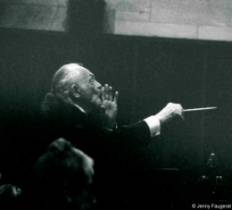 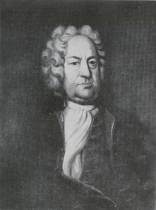
J.S. Bach Cantatas BWV 21, 56, 34, 46, 104
Rösl Schwaiger, soprano
Lorna Sidney, alto
Hugues Cuénod, tenor
Alois Pernestorfer, bass Wiener Kammerchor / Wiener Symphoniker
Jonatan Sternberg
Rec.: 1950 APE В-общем, это одно из главных сокровищ моей коллекции... |

